|
|
|
Sort Order |
|
|
|
Items / Page
|
|
|
|
|
|
|
| Srl | Item |
| 1 |
ID:
100274
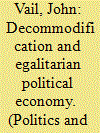

|
|
|
|
|
| Publication |
2010.
|
| Summary/Abstract |
This article contends that decommodification is an appropriate concept for understanding diverse initiatives such as fair trade, microfinance, open source, social enterprises, and the environmental commons as component features of a common process. Decommodification is conceived as any political, social, or cultural process that reduces the scope and influence of the market in everyday life. Given recent transformations in market societies, a more expansive framework for decommodification is urgently required. Decommodification would insulate non-market spheres from market encroachments; increase the provision of public goods and expand social protection; promote democratic control over the market by creating economic circuits grounded in a logic predicated on social needs rather than profit; and undermine market hegemony by revealing the market's true social costs and consequences. By ensuring basic needs, enhancing individual capacities and capabilities, and promoting social cooperation and collaboration, decommodification constitutes a central feature of an egalitarian agenda.
|
|
|
|
|
|
|
|
|
|
|
|
|
|
|
|
| 2 |
ID:
133435
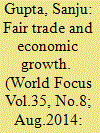

|
|
|
|
|
| Publication |
2014.
|
| Summary/Abstract |
Classical free trade theory, which originates from Adam Smith's and David Ricardo's theory of comparative advantage, claims that countries specialize in an export what they are relatively good at producing, and they import what they cannot produce sufficiently. Since for example the climate in Germany does not allow for the production of coffee ant since the infrastructure and the technological advancement for the manufacturing of car is not developed in Bolivia, both countries benefits from opening their markets for mutual trade. In theory, free trade is a win-win Situation which everyone benefits.
|
|
|
|
|
|
|
|
|
|
|
|
|
|
|
|
| 3 |
ID:
140962
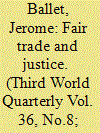

|
|
|
|
|
| Summary/Abstract |
In this article we first point out that the different conceptualisations of Fair Trade, which are sometimes analytically contradictory, actually form a coordinated set. Understanding the Fair Trade project is impossible without taking these interlinked conceptualisations into consideration. Second, this set basically forms a mechanism of structural, institutional and moral reforms that guide actions. In this way Fair Trade sets out to produce less injustice than is usually the case with the structures and institutions that govern conventional trade. Nevertheless, it does not try to define what a just society is or even to perfectly define ‘fair trade’. This implies the adoption of a comparative justice angle. It is precisely by linking comparative individual situations with the structures that produce these situations that relative justice can find its strength and purpose.
|
|
|
|
|
|
|
|
|
|
|
|
|
|
|
|
| 4 |
ID:
101616


|
|
|
| 5 |
ID:
147964
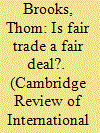

|
|
|
|
|
| Summary/Abstract |
Globalization contributes to a more interconnected global economy. This gives rise to greater challenges to providing a theory of global justice that can account for increasing complexities. Nicole Hassoun defends a powerful and distinctive contribution that claims that coercive institutions in the global order must secure sufficient autonomy to be legitimate because they are coercive. Fair Trade strategies are an illustration of a policy proposal for how globalization can be transformed into global justice. This article examines the issue of how much autonomy is ‘sufficient’ and whether a resource-based solution, like Fair Trade, is likely to contribute to that project. It is argued that the threshold for sufficient autonomy is too imprecise and much more than Fair Trade policies is required if global trade is to become a fairer deal for all.
|
|
|
|
|
|
|
|
|
|
|
|
|
|
|
|
| 6 |
ID:
144844


|
|
|
|
|
| Summary/Abstract |
The promotion of intensive farming through organic and fair trade certification appears contradictory to the increasing significance of non-farm income sources in rural Asia as well as in many other parts of the rural South. By observing a sugarcane producer co-operative comprising land reform beneficiaries in the Philippines, this paper explores the reality of livelihood diversification as practised by member households of the certified co-operative, focusing on the compatibility of certification-supported farming with diversified activities. In this case, diversification at the household level progressed both away from farming and into farming. Behind the long-term use of agricultural certification, there are compelling reasons for continuing both certification-supported farming and diversified activities, and for employing mechanisms that further the compatibility at all phases between the former and the latter, and maximising income-generating opportunities. The operation of communal land with agricultural certification may be an effective form of assistance to land reform beneficiaries who share a strong desire to be landowners.
|
|
|
|
|
|
|
|
|
|
|
|
|
|
|
|
| 7 |
ID:
079917


|
|
|
|
|
| Publication |
2007.
|
| Summary/Abstract |
This article situates the analysis of fair-trade consumption in the context of debates about civic activism and political participation. It argues that fair-trade consumption should be understood as a political phenomenon, which, through the mediating action of organizations and campaigns, makes claims on states, corporations, and institutions. This argument is made by way of a case study of Traidcraft, a key player in the fair-trade movement in the United Kingdom. The study focuses on how Traidcraft approaches and enrolls its supporters
|
|
|
|
|
|
|
|
|
|
|
|
|
|
|
|
| 8 |
ID:
077418
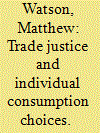

|
|
|
|
|
| Publication |
2007.
|
| Summary/Abstract |
A consistent theme of the existing literature is that fair trade consumption practices represent acts of justice. In this article I investigate such an equation from the perspective of the moral theory of Adam Smith. Smith explains the development of moral sensibilities via an imaginative act he calls `sympathy'. For Smith, justice prevails in interpersonal relationships in which the potential for one person to do harm to another is ruled out because their respective imaginations are in perfect accord, thus creating a situation of mutual sympathy. I advance two main conclusions. First, I argue that fair trade consumption is undoubtedly a moral act in the manner described by Smith, as it involves consumers responding to fair trade campaigns in order to trigger their moral sensibilities through exercising their imaginative faculties. Second, though, I argue that fair trade consumption is not specifically a moral act of justice in the manner described by Smith. The structure of fair trade invites the First World consumer to display sympathy for the Third World producer, but it provides no means for that sympathy to be reciprocated. As such, instances of genuine mutual sympathy do not arise. From a Smithian perspective, fair trade consumption practices are an act of beneficence rather than an act of justice. They thereby reside in the realm of private virtue rather than the realm of public duty, with significant implications for the way in which trade justice is conceptualized and studied in IPE
|
|
|
|
|
|
|
|
|
|
|
|
|
|
|
|
| 9 |
ID:
133113
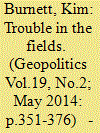

|
|
|
|
|
| Publication |
2014.
|
| Summary/Abstract |
Crisis can create opportunity for change. The 2007-2008 food price crisis has demonstrated that the existing structures of agricultural production and trade lend to food price volatility and renders many of the poorest people around the world vulnerable to food insecurity. Two movements that have raised such contentions over the years are the Fair Trade and Food Sovereignty movements, though in very different ways. My research examines the food crisis and its root causes, and the global governance mechanisms that have emerged in response. It then investigates and analyses whether and how these movements have responded to these new opportunities. The paper argues that engagement by both social movements is crucial to ensuring that the interests of those they represent are considered in the shaping of future governance of global food and agriculture.
|
|
|
|
|
|
|
|
|
|
|
|
|
|
|
|
| 10 |
ID:
109471


|
|
|
|
|
| Publication |
2011.
|
| Summary/Abstract |
Fairtrade market growth is characterised by expansion and exclusion in terms of producer opportunity. This paper draws producers in the Pacific region into the debate, analysing the development context among these small-island developing states and, specifically, the practices and principles of four 'ethical' enterprises. The analysis reveals that the unique and complex context in which these organisations operate is at odds with Fairtrade's requirements, standards and assumptions. The paper highlights the need for contextually relevant requirements and principles, and the likelihood of alternative governance arrangements and actors, for an inclusive Fairtrade system and market in the region.
|
|
|
|
|
|
|
|
|
|
|
|
|
|
|
|
| 11 |
ID:
096662


|
|
|
|
|
| Publication |
2010.
|
| Summary/Abstract |
This article categorises the emerging conceptualisations of Fair Trade and explores which of them offers the best characterisation of the project. It introduces Fair Trade and establishes a set of desiderata to guide the process of conceptualisation. It is argued that the practices and rhetoric of the project suggest it is best characterised as an attempt to establish a form of interim global market justice in a non-ideal world. Three alternative conceptualisations are explored, some including sub-categories. In each section a description of the view is outlined and it is argued that each such alternative is either an unpersuasive account of Fair Trade or cannot better the one already defended. In the final section the normative debate surrounding Fair Trade conceptualised as an attempt to establish interim global market justice in a non-ideal world is introduced. The article suggests that there are avenues for the project's ethical defence but concludes that this can be settled only with further research.
|
|
|
|
|
|
|
|
|
|
|
|
|
|
|
|
|
|
|
|
|